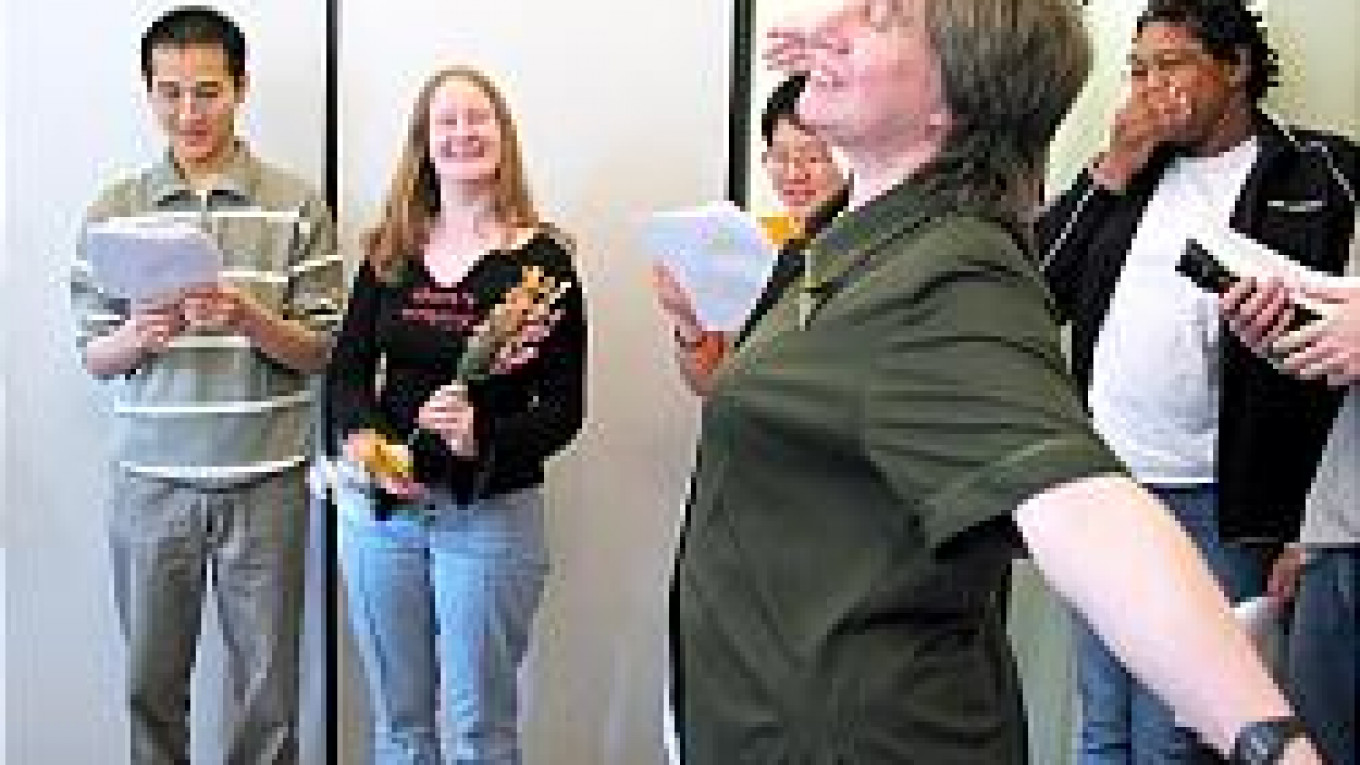In Moscow, it's the state known for its language training.
Middlebury College in the small town of Middlebury, Vermont, has a highly developed foreign focus for a liberal arts school of 2,200 students tucked in the insular Green Mountains. The college has been training language specialists in Russia for the past 25 years and is celebrating its silver anniversary on Tuesday in Moscow with a concert by its artist-in-residence, the opera and Negro spiritual singer Francois Clemmons.
The first American college to develop its own language-study program in the former Soviet Union, Middlebury now has program graduates littered throughout Russia. The school stresses total immersion in its language programs on campus and overseas.
Russia program head Amy Allington said the language pledge distinguishes the Middlebury College School in Russia from its competitors, which exploded in number during glasnost when study abroad restrictions on foreigners eased.
She said programs in the Soviet Union segregated foreign students, making it difficult for them to interact with their peer group. "But now that has changed," Allington said.
It's changed because the program has become more flexible for students with different language abilities, has moved students out of dorms and into host families, has created internship opportunities and has expanded into the regions.
An average five to eight Middlebury students now study at the Russian State University for Humanities, or RGGU, but in separate classes. A student with above-average Russian, though, can take regular RGGU classes.
Middlebury students are split between four locations: Moscow, Voronezh, Yaroslavl and Irkutsk.
Caitlin Ryan, a 2002 Middlebury graduate who studied with the program in Irkutsk, said some of Russian professors would baby Middlebury students.
"There was almost no homework, and when there was it didn't really matter whether we did it or not, because some professors felt bad giving the Americans too much work," said Ryan, who has lived in Moscow since January. "But anyone who has studied in Russia will also tell you that the experience ... is less about intense academic work as it is about finding your own way around, meeting people."
Few students are exclusively Russian language majors; Allington said the program attracts students interested in international relations, history or literature with a focus on Russia, but gets such diverse students as physics majors.
Since its inception in 1977, the program has moved more than 500 students through Russia, said Middlebury Russian professor Tom Beyer. It now attracts about 40 students a year.
Interest in Russia is waning, though, said Russian instructor Alexandra Baker, the widow of the program's founder, former Middlebury Russian department chair Robert Baker. "We used to have up to 25 majors and we once had up to 60 starting Russian 101. Now if we have 15 to 18 it's good, and in one recent year we had eight," she said.
Partially that concern caused the program to accept non-Middlebury students in the mid-1990s, and now only about 30 percent of students on the program are from the Vermont campus.
In 1967, Middlebury's administration became interested in establishing a language school in the Soviet Union and sent Robert Baker on yearly missions to negotiate with Soviet education authorities. When Soviet expert Olin Robison became the college's president in 1975, negotiations bore fruit: Middlebury launched a program at Moscow's Pushkin Russian Language Institute.
Through the years, the school weathered more challenges, most centered around regulating student behavior in a communist country. Baker said marriages between Middlebury women and Russian men occurred more frequently than their resident advisers would have liked; students threatened the program's future by stealing a Soviet flag from atop a government building once and a student was expelled for hanging a painting of former Soviet General Secretary Leonid Brezhnev in his dorm's toilet.
In 1990, the program moved its headquarters from the Pushkin Institute to Moscow State University to allow them to interact more with Russian university students. Ten years later, the program moved to RGGU, which provided a more flexible format, Baker said.
Because the program has moved around, Allington said Middlebury chose to include all the program's former hosts and associates in its anniversary concert.
"We wanted to do something that could honor all the people we worked with," she said. "Francois Clemmons is trained in opera but then later moved to Negro spirituals, which should be novel for Russians."
The concert will start at 6 p.m. on Tuesday at St. Andrew's Church, 8 Voznesensky Pereulok. Tickets are free; call Amy Allington at 244-7655 for information.
A Message from The Moscow Times:
Dear readers,
We are facing unprecedented challenges. Russia's Prosecutor General's Office has designated The Moscow Times as an "undesirable" organization, criminalizing our work and putting our staff at risk of prosecution. This follows our earlier unjust labeling as a "foreign agent."
These actions are direct attempts to silence independent journalism in Russia. The authorities claim our work "discredits the decisions of the Russian leadership." We see things differently: we strive to provide accurate, unbiased reporting on Russia.
We, the journalists of The Moscow Times, refuse to be silenced. But to continue our work, we need your help.
Your support, no matter how small, makes a world of difference. If you can, please support us monthly starting from just $2. It's quick to set up, and every contribution makes a significant impact.
By supporting The Moscow Times, you're defending open, independent journalism in the face of repression. Thank you for standing with us.
Remind me later.


